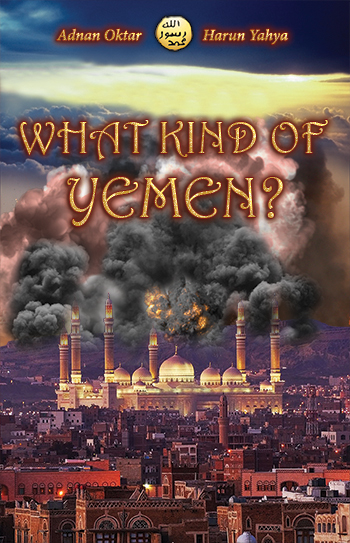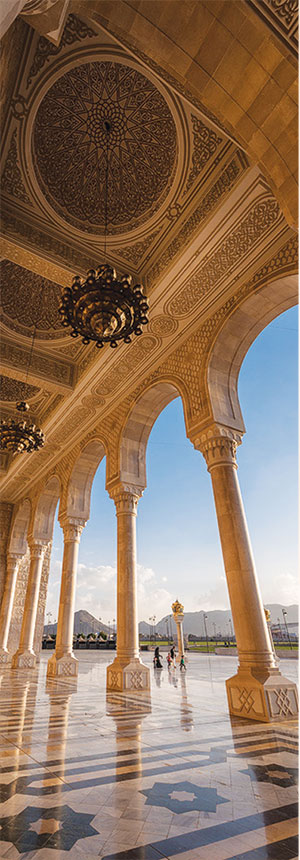Bigotry: The Dark Danger
What Kind of Yemen?

DOWNLOAD THE BOOK
CHAPTERS OF THE BOOK
- Introduction
- Two Countries Geographically Far Apart But Very Close in Heart and Soul: Yemen and Turkey
- Yemen, But What Sort of Yemen?
- The Problem of Poverty in Yemen and Regeneration
- How To Ensure the National Unity of Yemen?
- How Can Yemen Best Make Use of Its Natural Wealth?
- Women's Place in Yemeni Society
- The Lowest Common Denominators the Parties in Yemen Can Agree on
- The Importance of Individual Rights and Freedoms in Yemen
- Terror Is Again at the Top of Yemen's Agenda
- The Corruption Eating Away at Yemen from the Inside
- One of the Dozens of Problems Facing Yemen Is Immigration
- Key to Democracy and Development in Yemen: Education
- Countries Swamped by Debt and Interest
- Political Life in Yemen
- Why Is Military Spending Significant?
- Houthis Are the Brothers of All Yemenis
- Yemen Must Not Fall into the Trap of Identity Politics
- The Protests in Yemen Should Not Turn into a Mass Frenzy
- Mindsets Need To Change for A Permanent Peace in Yemen
- What Can Be Done To Ensure Stability in Yemen?
- Will the New Government in Yemen Bring Stability?
- Yemen Doesn't Deserve To Be A Failed Country
- The Problems of Yemen Can Be Solved When A Strong National Security Is Built
- Military Operations Do Not Always Produce A Solution
- Political Instability in Yemen Is Having a Damaging Effect on Children
- Spirit of Unity a Must for Yemen's Political Transition
- What Yemen Needs Is a Spirit of Union and Unity
- Yemenis Must Be Friends, Not Enemies
- There Is Still Hope for Peace and Democracy
- The Struggle for Power Must Not Break Yemen Apart
- Yemen Must Not Become a Trojan Horse on the Arabian Peninsula
- Developments in Bahrain, Yemen and Other Islamic Countries Must Not Be Allowed To Turn into A Sectarian Conflict
- Is This the Will of Yemenis or the Global Powers?
- Operation Decisive Storm Brings Not Stability But Death to Yemen
- Turkey Asks for Peace in Yemen, Not War
- Deaths Cannot Stop More People Being Killed
- Yemen Needs Urgent Ceasefire
- What Is Happening in Yemen Is No Longer a Political, but a Humanitarian Crisis
- An International Model To Put an End to the Conflict in the Islamic World Is Possible
- A Lack of Quality Is Feeding the Conflicts in the Islamic World
- Yemen: A Country That Nobody Sees and Nobody Hears
- The Only Solution to the Tragedy in Yemen: The Reconstruction of Peace and Love
- Conclusion
< <
8 / total: 44
The Lowest Common Denominators the Parties in Yemen Can Agree onNational Yemen, May 3rd 2014
Politics in many countries, from Argentina to Canada and from South Korea to Turkey, takes place by means of political parties. Political parties are indispensible to modern politics and democracies. Parties may be regarded as the main tool of democracy or a source of oppression, but they are nonetheless links between the state and the people. Some of the parties in Yemen that have kept this bond alive are: The Yemeni Socialist Party (YSP), the General People's Congress (GPC), the Islaah Party (The Yemeni Congregation for Reform), the Peoples Nasserite Reformation Party, the Liberation Front Party, the Nasserite Democratic Party, the League of the Sons of Yemen, the Federation of Popular Forces, the National Arab Socialist Ba'ath Party, the National Democratic Front, Al Haq Party, the Yemen League Party, and the National Social Party. As of 2003, the active parties are the GPC, Islaah, the Yemeni Socialist Party (YSP), the Nasserite Unionist Party, and the Arab Socialist Ba'ath Party.
Some of these parties espouse liberal policies and others an Islamic conception of politics. There are also parties in Yemen, like the Ba'ath parties in Iraq and Syria, that support pan-Arab nationalism. Parties in Yemen try to win elections, and thus gain power, by promising to do what society wants. Yet it goes without saying that some parties may fail to resolve national problems or even to identify problems.
Although the repression caused by Ba'athist regimes in Arab countries is obvious, there are still parties in Yemen that claim there can be a better future through socialist or Nasserite policies. The failures of the Ba'ath parties that were active until recently in Iraq and Syria inflicted terrible disasters on their countries. On the other hand, the Muslim Brotherhood's Freedom and Justice Party in Egypt was overthrown due to concerns it would exclude all those who did not support it. There is no civil war like that in Syria in Egypt now, but there is also no democracy. There is also a good deal of tension over a wave of turmoil and violence that may explode at any moment.
In contrast to these poor examples, there is still a functioning democracy in Yemen. It is vitally important for democracy to keep functioning, no matter how great the ideological gulfs between the parties so it is therefore essential for the parties in Yemen to compromise on a lowest common denominator. Moreover, it is also possible to establish those denominators without changing or restricting parties' ideologies. The main points that the parties need to agree on in order to maintain Yemen's national integrity and democratic life are as follows: ◉ To take care over protecting Yemen's status as a state respecting the rule of law; ◉ To oppose any kind of totalitarian regime, whether of the right or left; ◉ To oppose policies based on ethnic or sectarian separation; ◉ To support human rights and the free expression in society of all opinions and beliefs, regardless of what ideology or world view they may represent; ◉ To reject the use of violence in order to impose one's own views. The last and most important element is for all the political parties in Yemen to declare their unequivocal devotion to democracy. The greatest responsibility for preserving democracy in the country lies with Yemeni Muslims because freedom of thought, belief and expression – which we attribute to democracy – lie at the heart of Islam. Some people imagine that democracy first appeared in ancient Greece. Yet it is God Who teaches people democracy. All of the prophets, from Adam (pbuh) on, have been representatives of freedom, free thinking and respect for ideas. Concepts such as liberty, justice, oppression of none, treating everyone as a first-class citizen, trust in, and respect for, all people and not judging anyone because of their ideas – which are all principles that come to mind when democracy is mentioned – exist at the heart of the moral values of the religion. People have learned them through the Divine faiths revealed by God and have witnessed their finest examples at times when people lived by Divine religions. Like all the other prophets, many events representing a democratic way of thinking occurred during the prophethood of the Prophet Muhammad (pbuh). People of various faiths, tongues, races and cultures lived side by side in the lands where the Prophet Muhammad (pbuh) lived. It was very hard for these communities to live together in peace and trust as it was difficult to contain those groups that tried to incite hatred amongst them for each other; one group might immediately be angered and attack another over the slightest word or action. However, our Prophet's (pbuh) conception of democracy and just rule was as much a source of peace and confidence for these communities as it was for Muslims. Christians, Jews and pagans were treated justly in the Age of Felicity. In line with God's words that "There is no compulsion in the religion…" (Surat al-Baqara, 256), our Prophet (pbuh) told everyone of the moral values of the faith, but then left everyone free to choose for themselves. When people live by Almighty God's religion in the way commanded in the Qur'an, then there will be the true justice, democracy, respect and love for which people long. By God's grace, very soon democracy, brotherhood, love, friendship and peace will reign across the world, not just in Yemen, and in a way never seen before, and people will at last enjoy the most abundant joy and prosperity.
|
8 / total 44
You can read Harun Yahya's book What Kind of Yemen? online, share it on social networks such as Facebook and Twitter, download it to your computer, use it in your homework and theses, and publish, copy or reproduce it on your own web sites or blogs without paying any copyright fee, so long as you acknowledge this site as the reference.


